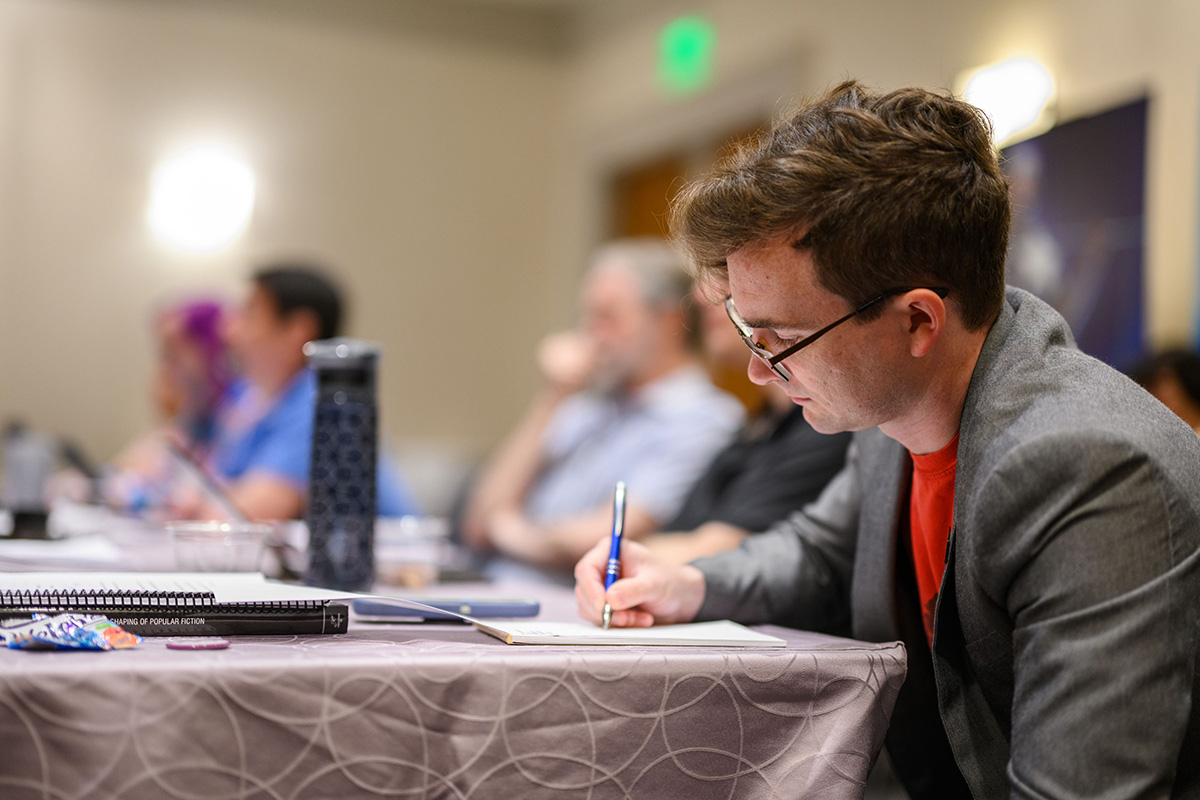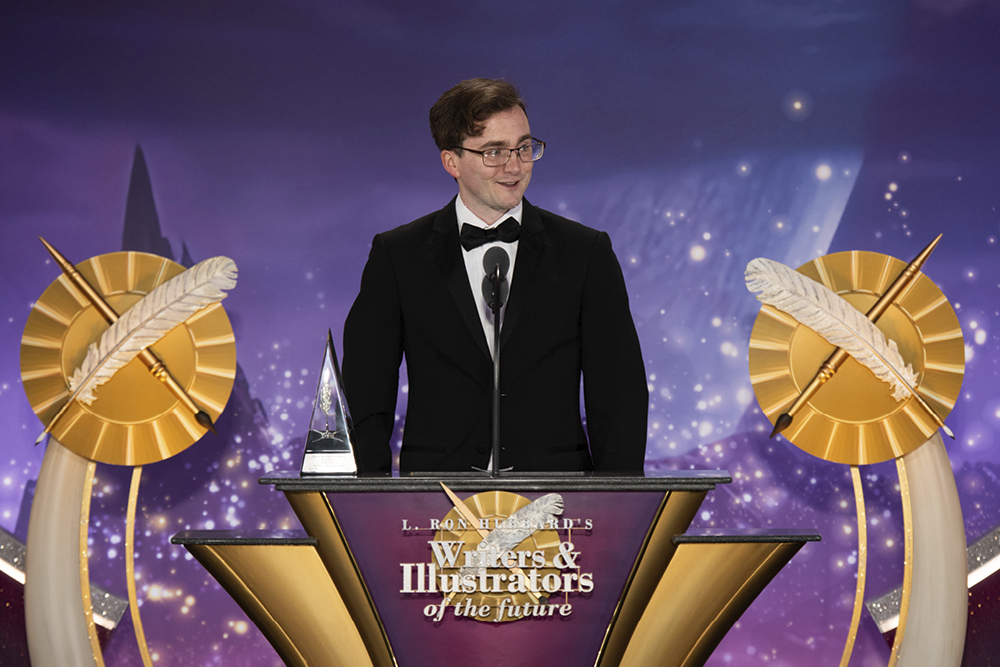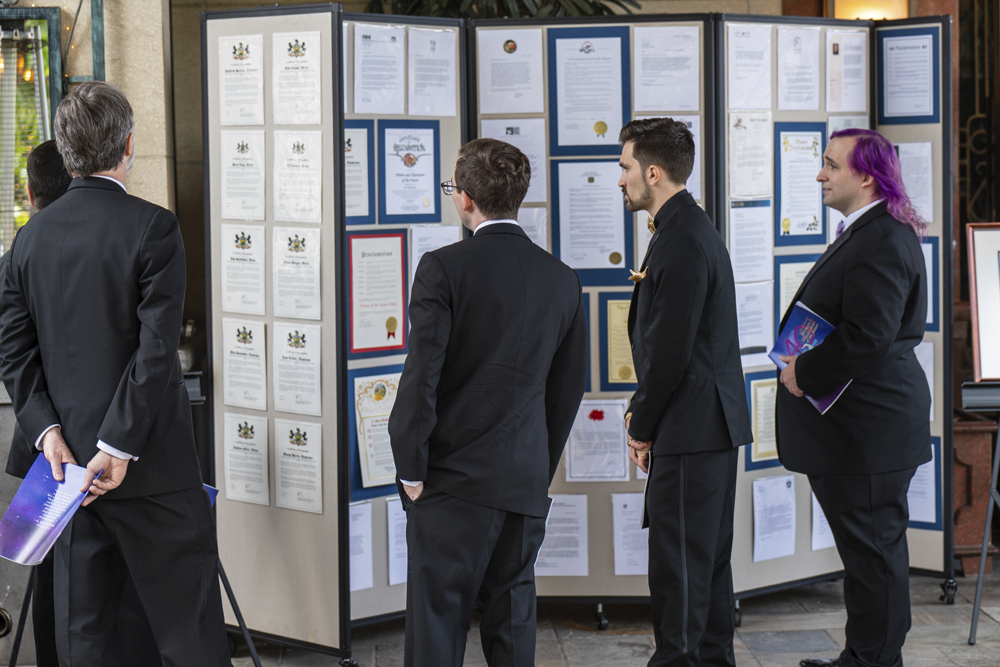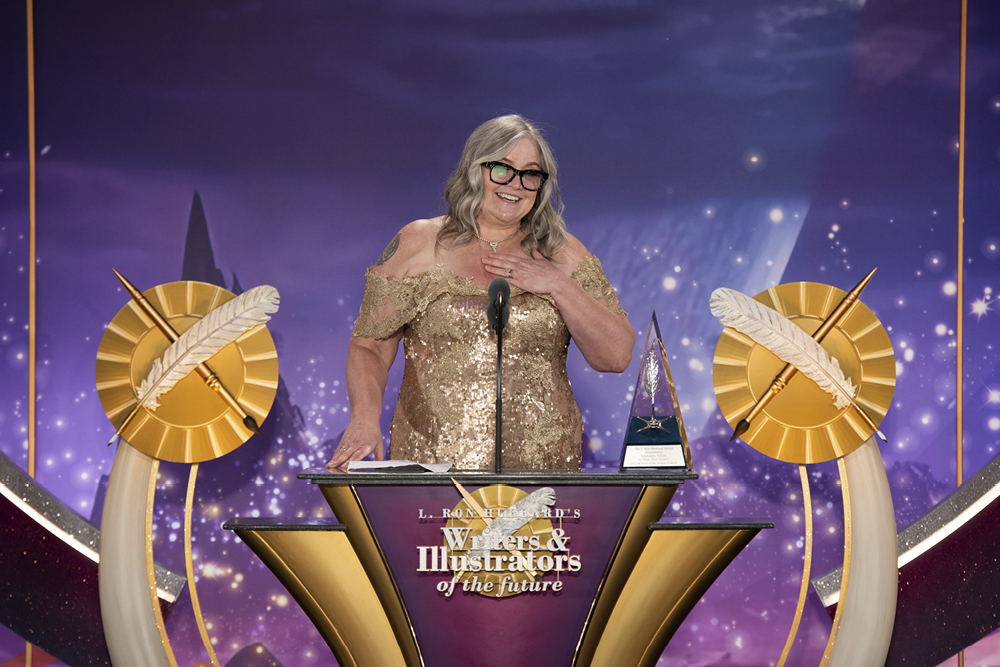Beta Reading for Better Writing
To win the Writers of the Future Contest and get published in the L. Ron Hubbard Presents Writers of the Future anthology, you need a combination of three things: talent, luck, and hard work. Spoiler alert: my own version of hard work yielded a concentrated conglomerate of computed writing tips, which I’ll share with you after a little context.
If you happen to be born with immense natural talent, you might not have to work that hard and you might not need to get that lucky. I was not born with immense natural talent. In fact, when I was born I couldn’t even speak English (or any other language, for that matter), let alone write it.
And yes, some of you reading this may have been born with immense natural talent. Spoiler alert: almost every writer thinks this at some point or another, even if only briefly. Unfortunately, almost every writer also thinks “I have no talent whatsoever” from time to time. And despite nearly all of us being wrong on both counts, the kicker is that you can’t control how much natural talent you have. (I won’t even get into the argument that natural talent might be a myth.)
You can, assuming a reasonable amount of talent, hope to get lucky, and only expend as much hard work as it takes to write one story. Perhaps your story is about a character whose name is identical to both the slush reader’s best friend and the Writers of the Future Contest Coordinating Judge’s most adored grandmother, and the conflict happens to be related to a technological breakthrough that captures the imagination of everyone just before your story is read. That would be very fortunate indeed, but unfortunately it’s also very out of your control.
So, as I was saying, there is one component (that you can do something about, at least) to winning the Writers of the Future Contest, or honestly getting published anywhere: hard work.

And I can say this because I won Writers of the Future and my story “Ashes to Ashes, Blood to Carbonfiber” is published in Volume 40—writing that still hasn’t gotten old—and it took a lot of hard work.
I first entered the Writers of the Future Contest a decade ago, resting on “natural talent” and hoping for a good dollop of luck. Of course, I got a rejection and I was heartbroken. I had put so much effort and time into that 16,500 “short” story. Or so I thought. Factually, writing whatever comes to mind in the moment and doing little more than a typo-check isn’t much effort at all.
The rejection lit a fire under me, though, as well as giving me a much-needed wake-up call. If I wanted to win this I needed to work for it. I reread the L. Ron Hubbard Presents Writers of the Future anthology that I had, read about the craft online (chiefly, David Farland’s Daily Kick in the Pants newsletter and Robert J. Sawyer’s “On Writing” columns—David was the Writers of the Future Contest Coordinating Judge at the time, and Robert remains a judge of the Contest), and joined the Writers of the Future Forum.
I applied everything I had learned, revised 16,500 words down to 14,000, and resubmitted. I received an Honorable Mention (for those unfamiliar with the Writers of the Future competition results structure, roughly the top ten percent get Honorable Mentions). I simultaneously felt overjoyed and disappointed. I had proof that I was improving as a writer, that I wasn’t the worst out there. But I also hadn’t won, and again, I thought I had worked so very hard.
But I hadn’t.
It was around then that I discovered the age-old adage, “the first million words are practice,” confusingly attributed to Stephen King, Marion Zimmer Bradley, Ernest Hemingway, Isaac Asimov, and David Eddings, to name a few. And that gave me some idea of the work I needed to put in.
And those one million words, they need to be good ones. Deliberately your best written words. I don’t believe they actually count unless you finish the story, although I didn’t know that at the time. So I started to read and write more stories, specifically the shorter formats. Up until that point, other than the Writers of the Future anthology, I had only read novels. But reading novels as practice for writing short stories is like watching movies in preparation to film a ten-second TikTok video, or running marathons to train for a hundred-meter sprint.
So I started reading short stories, and I couldn’t recommend it more. You can get almost as much satisfaction, enjoyment, and craft from a good short story as a novel. Sometimes even more. If you’re unsure where to look, my shortlist would be: L. Ron Hubbard Presents Writers of the Future, Clarkesworld, Beneath Ceaseless Skies, Escape Pod, and Apex Magazine. But there are scores of amazing magazines out there, and almost all of them have free stories available for anyone to read.
At some point I let life get in the way of writing: I started training for the Royal Navy, switched paths and started a new career, fell in love, acquired a daughter, moved across the country, doubled-down on the career, moved to a new country, and had several more daughters.

Fortunately, after a decade of writing in small snatches of spare time, with no intention to submit, I returned to writing, and the Writers of the Future Contest, in earnest. I got another Honorable Mention, and celebrated by buying the latest volume of the Writers of the Future anthology.
Contrary to the adage “work smarter not harder,” I would suggest working hard smartly. My version of this looked like changing up the writing I was doing, and interspersing my writing sessions with a lot of reading. Specifically, reading the recent volumes of Writers of the Future.
First part first, I recommend writing widely, writing out of your comfort zone, and writing to completion.
By widely, I mean different lengths and genres. Try a drabble (100 words), a flash (under 1000), and a load of shorts everywhere between 2,000 and 17,000 words. Same with genre. If you want to keep it speculative, try cross-genre. Pen a great cozy-mystery in space, a high fantasy thriller, or a rom-horror. Actually, maybe not that last one.…
Not only will each teach you different skills, but you may also find your new comfort zone. Your new strength.
And finish each one. There is so much more to be learned by finishing one than starting many. Pacing, theme, plot. You’re missing a part of each of these without your ending. Your opening is a promise to a reader. How can you know that you’ve made a decent promise if you haven’t fulfilled it?
Finish what you write.
And second part second, when you’re not writing, enjoy and study those volumes of the Writers of the Future anthology. I especially recommend the most recent ones, not only because my own story “Ashes to Ashes, Blood to Carbonfiber” features in Volume 40, but because they are most relevant. The zeitgeist changes and people change. The slush readers, the Coordinating Judge, the judges, are all reading new things, developing new interests, gaining new pet hates.
Not that there aren’t some incredible stories in the older volumes (my particular favorites include “On My Way to Paradise” by David Farland in Volume 3 and “Road to Levenshir” by Patrick Rothfuss in Volume 18, but they’re all wonderful stories). While they will teach you the craft of short stories and writing in general, they won’t necessarily teach you what this year’s Coordinating Judge (the wonderful Jody Lynn Nye) is looking for, or what the current zeitgeist in writing is.
Throughout this “working hard smartly” phase I kept submitting every quarter of the Contest (while not the subject of this article, “submit every quarter” is the most important advice I can give), and as I expanded my comfort zone and studied the recent volumes, my stories rose from Honorable Mention to Silver Honorable Mention (which are roughly equivalent to the top two percent of submissions).
And then I discovered one source of information even more relevant than the latest volume.
Beta reading for the next one.
As an ardent member of the Writers of the Future Forum, I noticed a request for beta readers for Volume 39 from Galaxy Press’s Managing Editor, Meliva Koch, and I jumped on it.
And this time, my reading experience was completely different. As a beta reader, obliged to scrutinize each story for typos, errant homonyms, and deviations from the Chicago Manual of Style, I was forcibly distanced from the stories, kept from being caught up in their magic and carried away. It kept my analytical mind open and operating more than any time I’d previously tried to study a story.
And after gleaning more about character flaw, emotional beats, pacing, and many other aspects of writing than I have room for, that logical inclination kept going and demanded I take this art-ruined-in-the-name-of-science study to a spreadsheet. I combed through each story for each of the Unwritten Rules and Super Secrets and recorded my findings.
I found that in the first 450 words:
- 92% had an obvious hook: all of those are in the first 120 words. 42% get to it in the first 20 words.
- 75% had their inciting incident.
- 17% had their main character (MC) “pet the dog” (obviously/clearly do/intend to do something nice).
- 84% made their MC blatantly likable or pitiable.
- 84% shared their MCs name. 50% did it in the first 5 words.
- 64% clearly showed the MCs internal motivations.
- 91% clearly showed the MCs external motivations—those that didn’t, all showed an internal motivation.
- 67% included a sound.
- 67% (but not the same 67%) included a smell.
- 67% (again, a slightly different subset) included a touch sensation.
- 42% included a taste. I found this lower percentage interesting because the previous Contest Coordinating Judge (David Farland) was a vocal supporter for including taste. But then again, it is one of the trickier senses to include.
- 33% included all four.
- 16% did not include any, and another 16% only included one of the senses.
- 100% visually described the micro-environment (the setting immediately surrounding the MC)—though one of them did so very lightly.
- 84% described the macro-environment (the setting around the micro-environment, e.g., far off mountain ranges, the era of time, the culture).
In hindsight, there are some more factors I would have liked to study. Which POV and tense they used, how many characters and POV characters they had, whether it was fantasy or sci-fi, and how much they described their characters’ external appearances. I also contemplated doing the same study to previous versions, but now I had a fire lit under me. I had broken down the ephemeral art into simple paint numbers that even a humble engineer like myself could follow.
Also, where previously I had been studying the same works available to all of the other thousands of submitters, this time I had an advantage. I had information that no one else had! No one else apart from the other dozen beta readers … and the couple hundred Writers of the Future forumites with whom I immediately shared all of my findings.
[Brief aside: seriously, if you want to win, join the Forum. The Forum is an endless source of information and discussion on the Contest and writing in general, and a supportive community to boot. Every quarter the forumites gather virtually to await the hallowed “phone call” from Joni Labaqui (the Contest Administrator) that the eight Finalists receive, and the flurry of emailed results that come shortly afterward.]
After completing and sharing my spreadsheeted analysis—I suspect it was the same night although my memory is a nebulous thing—I had an unnaturally vivid dream. It came replete with setting, a main character with a flaw and a goal, and a conflict that tied the two together! Moreover, the fragments of story that were there excited me.
I couldn’t wait to write it down the following morning, and all of the analysis I had done flew straight out of mind. The story poured forth from my fingertips effortlessly, and I wrote “THE END” sooner than I normally would. After leaving it to marinate for a few days, I recalled all of the work I’d put into analyzing Volume 39 and returned to edit my story to fit the mold.

And I was delighted to find that it already did. The first line introduced the main character and the setting and had a hook (I think. I’m still a poor judge of hooks). The first page included three of the senses: hearing, touch, and taste. And the plot kicked off within the first two pages, and I’d argue it was hinted at in the first line.
That’s not to say there wasn’t editing to do. There was. A lot. And I had more to do after it had passed through my first reader, and more still after my critique partners got their hands on it. And more after I’d let it lie for a couple weeks: much of that editing was putting back in some of which I had taken out in the previous rounds, although worded slightly less clumsily (I hope).
And then I submitted it.
I didn’t think of it as “a winner” any more (or less) than I had any of my previous stories—which in every case was an ever-twitching needle, most often found around “worth a shot,” but which could occasionally slam into either end of the spectrum from “waste of pixels” to “I think I’ll pack for LA weather.”
And three months later, in a parked car packed with all of my family, watching the July 4th fireworks in the thundering rain, I noticed a missed call from Joni.
And all it took was a combination of three two things: talent, hard work, and a generous dose of luck.
Now I’m working hard on the next projects: querying agents and publishers on a complete 110,000-word epic fantasy, and plotting/writing two other novels, and hoping that the requisite luck will show up at an opportune moment, too.

When James Davies isn’t repairing linear accelerators or parenting his eighteen daughters—four feral humans and fourteen well-mannered hens—he reads, writes, and fells trees.
James was raised among the rolling green hills of England’s “home counties” but was introduced to fantasy and science fiction when he stumbled across David Farland’s The Sum of All Men in a random bookstore in Kenya when he was ten.
After devouring the entire Runelords series, James joined the Runelords online community where David Farland then introduced him to the Writers of the Future Contest and urged him to write.
Various stages of life have interrupted James’s passion for writing (living in China with Shaolin monks, a master’s degree in electronics, falling in love, and relocating to Maryland, US). But two years ago, he approached it from a new direction: no longer writing for the sake of writing, but studying the craft with a focus on improvement.




Nice ??
Thanks Isabella!
Thanks for the analysis James. Congrats on the win and best of luck (and hard work) on the epic fantasy!
Thank you, Martin. And thank you for your generous help with analyzing Volume 40!
Keep working hard and keep submitting and they’ll be asking you for a blog post about your journey to winning soon enough ?
Thanks for the info, James! This analysis was an eye-opener.
Thank you, Martin. And thank you for your generous help with analyzing Volume 40!
Keep working hard and keep submitting and they’ll be asking you for a blog post about your journey to winning soon enough ?
Congrats, Ease!